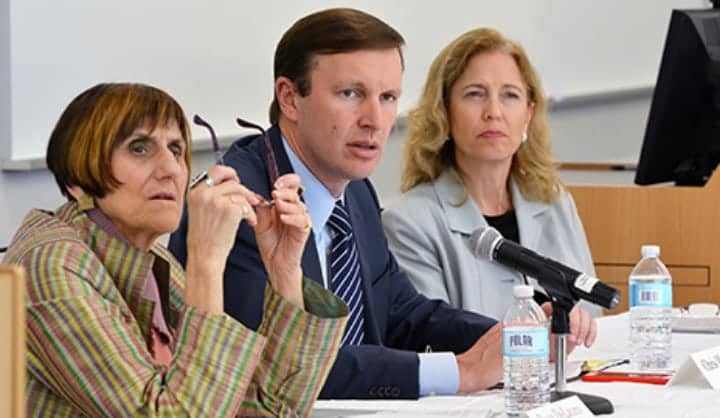
Photo Credit: YaleNews
Researchers, patients, physicians, nurses, and politicians gathered for Connecticut’s Cancer Moonshot Roundtable event on May 31, 2016, which was moderated by Senator Chris Murphy. The discussion focused on the Federal Cancer Moonshot Initiative being lead by Vice President Joe Biden, and the work being done by Connecticut biotech companies, research institutions, and treatment centers to develop innovative cancer treatments and devices in CT. In Senator Murphy’s words the event was addressing “specifically, Connecticut’s role and potential in meeting this challenge laid out by the President.”
The Cancer Moonshot Initiative was launched by Vice President Biden earlier this year with the goal of finding better treatments and cures for cancers. Senator Murphy and Congresswoman Rosa DeLauro asked attendees about the current work being performed in Connecticut and what is needed on the federal level to ensure this effort is successful. Congresswoman DeLauro highlighted the importance of communication between government and the biotech industry as “eradicating cancer requires the formation of new alliances”.
“Eradicating cancer requires the formation of new alliances” @rosadelauro #cancermoonshot
— Ellen T. Matloff (@MyGeneCounsel) May 31, 2016
//platform.twitter.com/widgets.js
Senator Murphy is a member of the Senate Committee on Health, Education, Labor, and Pensions (HELP) and the Senate Appropriations Committee. He has been focused on the Moonshot Initiative with the goal of providing Connecticut’s research industry sufficient funding to support patient and providers. Congresswoman DeLauro, a 30-year ovarian cancer survivor, is an outspoken voice for health research in the House of Representatives.

There were common themes and message from attendees during the open floor portion of the event. Numerous individuals spoke about the cuts in federal monies for scientific research, flaws in the current grant-writing process, and urged that in order “to accelerate this process, we need to cut the red tape”. Supporting basic research was another recurring talking point: “we do not know where the next breakthrough will be for anti-cancer drugs, we need to support basic research as broadly as possible.”
Another attendee brought attention back to the patients who are most benefitting from increased funding, “bringing the funding bar up on a yearly basis is going to be huge, not just for the success of the scientist and clinician, but the success of patients and their families”. A patient who battled cancer expanded upon this by sharing, “everyone in this room has contributed in some way to me being here today”.
JoAnne Goodnight, from Jackson Laboratory for Genomic Medicine, ended the event with fitting, inspiring words, “We put a man on the moon, we can make this initiative work”.
“We put a man on the moon, we can make this initiative work” @joannegoodnight from @jacksonlab #cancermoonshot #livetweet
— Ellen T. Matloff (@MyGeneCounsel) May 31, 2016
//platform.twitter.com/widgets.js
Closing remarks from Senator Murphy and Congresswoman Rosa DeLauro stressed this roundtable as the beginning of our conservation, not the end. We hope to continue to see this open communication between Connecticut and Washington in our collaborative efforts to achieve the goal of the cancer moonshot.
The conversation continues on National Cancer Moonshot Day, 6/29! Can’t make a live event? Join our tweetchat on Twitter at noon ET using #hcchat to follow the discussion, voice opinions, share knowledge and ask questions.

